Get free scan and check if your device is infected.
Remove it nowTo use full-featured product, you have to purchase a license for Combo Cleaner. Seven days free trial available. Combo Cleaner is owned and operated by RCS LT, the parent company of PCRisk.com.
What is vinkens[.]com?
During a routine inspection of untrustworthy websites, our researchers discovered the vinkens[.]com deceptive site. When we inspected this page, we learned that it promotes several scams. While they make different claims, their goals are likely the same - to endorse untrustworthy or malicious software.
![vinkens[.]com scam](/images/stories/screenshots202203/vinkens-com-scam-main.jpg)
Vinkens[.]com promoted scam overview
We discovered three scams promoted on the vinkens[.]com webpage. One claimed that the visitor's iPhone had been infected due to visits to compromised websites. The fake browser trojans had supposedly caused 59% damage to the iOS.
To further scare the visitor, this scam warned that their private apps, photos, Facebook accounts, and WhatsApp messages are at risk. An additional scare-tactic was the inclusion of a countdown. The user was pushed into pressing the "Install" button, as it was an implied necessity to remove the threats.
It must be emphasized that no site can detect the viruses present on visitors' devices; hence, any that make such claims must not be trusted.
The second scam included an image of a video player, above instructions directing the user to tap "Play" and install an application necessary to resume watching online content safely.
The third scam that we observed was thematically identical to the second. However, in this variant, the video player's design mimicked the one used by the YouTube video-hosting platform. Atop the player was a pop-up, likewise stating that an app must be installed to continue watching safely.
It has to be reiterated that the information provided by vinkens[.]com - is false.
Typically, scams of this kind endorse fake anti-virus tools, adware, browser hijackers, and various PUAs. We have noted a few cases of such scams proliferating trojans, ransomware, and other malware. The cyber criminals may also use this deceptive content to promote genuine products (without the developers' approval) in order to acquire illegitimate commissions from affiliate programs.
To summarize, by trusting scam websites like vinkens[.]com, users can experience system infections, severe privacy issues, financial losses, and identity theft.
| Name | vinkens.com pop-up |
| Threat Type | Phishing, Scam, Mac malware, Mac virus |
| Fake Claim | User's iPhone might be infected; an app must be installed to watch online content safely. |
| Detection Names | N/A (VirusTotal) |
| Symptoms | Your Mac becomes slower than normal, you see unwanted pop-up ads, you are redirected to dubious websites. |
| Distribution methods | Deceptive pop-up ads, free software installers (bundling), fake Flash Player installers, torrent file downloads. |
| Damage | Internet browser tracking (potential privacy issues), display of unwanted ads, redirects to dubious websites, loss of private information. |
| Malware Removal (Windows) |
To eliminate possible malware infections, scan your computer with legitimate antivirus software. Our security researchers recommend using Combo Cleaner. Download Combo CleanerTo use full-featured product, you have to purchase a license for Combo Cleaner. 7 days free trial available. Combo Cleaner is owned and operated by RCS LT, the parent company of PCRisk.com. |
Similar scam website examples
Protectconnection[.]icu, takkiukaya[.]com, systemupdati[.]xyz, and blocker[.]digital are a few examples of webpages similar to the vinkens[.]com site.
The Internet is rife with misleading, deceptive, and malicious material. In addition to fake virus warnings and missing software alerts, other popular models include - bogus lotteries, surveys, reward programs, giveaways, and so on. Due to how widespread scams are, we strongly advise exercising caution when browsing.
How did I open a scam website?
Deceptive websites are rarely accessed intentionally. Users can enter them via redirects caused by sites that use rogue advertising networks - upon initial access or when hosted content (e.g., buttons, links, ads, etc.) is clicked.
Online scams are also promoted through intrusive advertisements and spam browser notifications. Mistyping a URL can result in a redirect (or a redirection chain) landing on a scam webpage. Adware can display scam-endorsing adverts or force-open such sites.
How to avoid visiting scam websites?
Rogue advertising networks are known to push online scams. We advise against visiting websites that offer pirated content or other questionable services (e.g., Torrenting, illegal streaming/downloading, etc.) - as they are typically monetized through these networks.
To avoid receiving scam-promoting browser notifications, do not permit suspicious sites to deliver them (i.e., do not click "Allow", "Allow Notifications", etc.). Instead, ignore or deny notification delivery requests (i.e., press "Block", "Block Notifications", or similar).
We recommend researching software and downloading only from official/verified channels - to prevent adware from infiltrating your system. Additionally, treat installation processes with caution, e.g., read terms, study possible options, use the "Custom/Advanced" settings, and opt-out of all supplements.
If your computer is already infected, we recommend running a scan with Combo Cleaner Antivirus for Windows to automatically eliminate all threats.
Text presented in one of the scams promoted on the vinkens[.]com website:
Your Apple iPhone may be infected!
We assume that your OS (59%) may be DAMAGED BY BROWSER TROJAN VIRUSES while browsing recently corrupted sites.
It is advisable to install a mobile security app, otherwise sensitive data such as your Facebook account, WhatsApp messages, photos and private apps could be infected and stolen.
-3 minute 0-38 second
Install Cancel
Appearance of another scam promoted on vinkens[.]com:
![vinkens[.]com scam variant 2](/images/stories/screenshots202203/vinkens-com-scam-variant-2.jpg)
Text presented in this scam:
Press Play for install app and continue watching safely
Appearance of yet another scam promoted on vinkens[.]com:
![vinkens[.]com scam variant 3](/images/stories/screenshots202203/vinkens-com-scam-variant-3.jpg)
Text presented in this scam:
Available
Install VideoCast to continue watching in a safe mode
Watch in APP
To enable pop-up blocking, fraudulent website warnings, and remove web browsing data in mobile Apple devices, follow these steps:
First, go to "Settings", and then scroll down to find and tap "Safari".
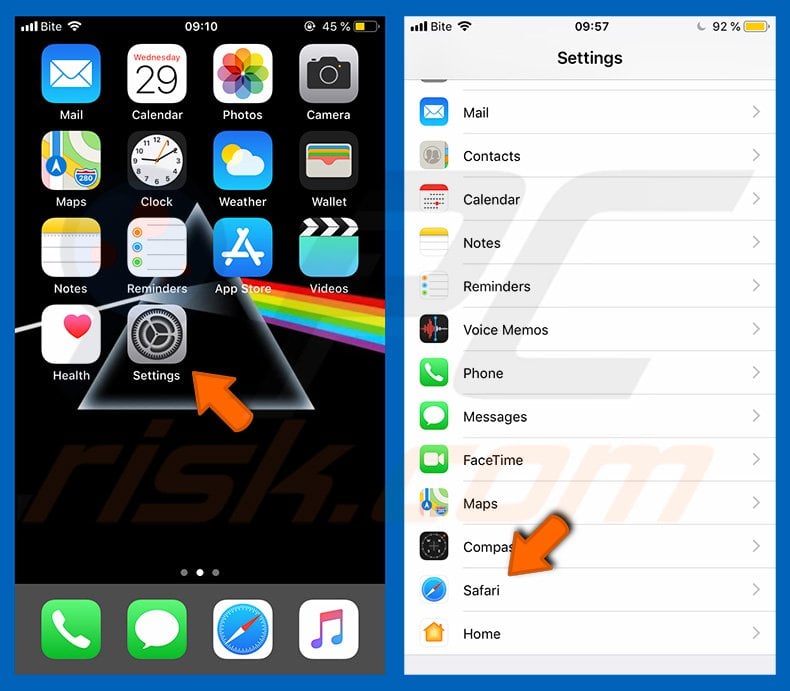
Check if the "Block Pop-ups" and "Fraudulent Website Warning" toggles are enabled. If not, enable them immediately. Then, scroll down and tap "Advanced".
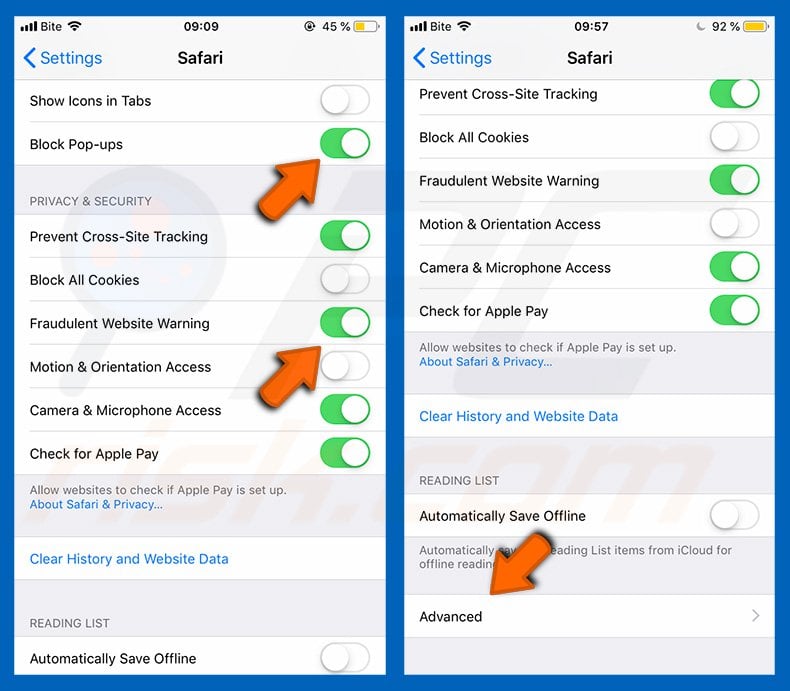
Tap "Website Data" and then "Remove All Website Data".
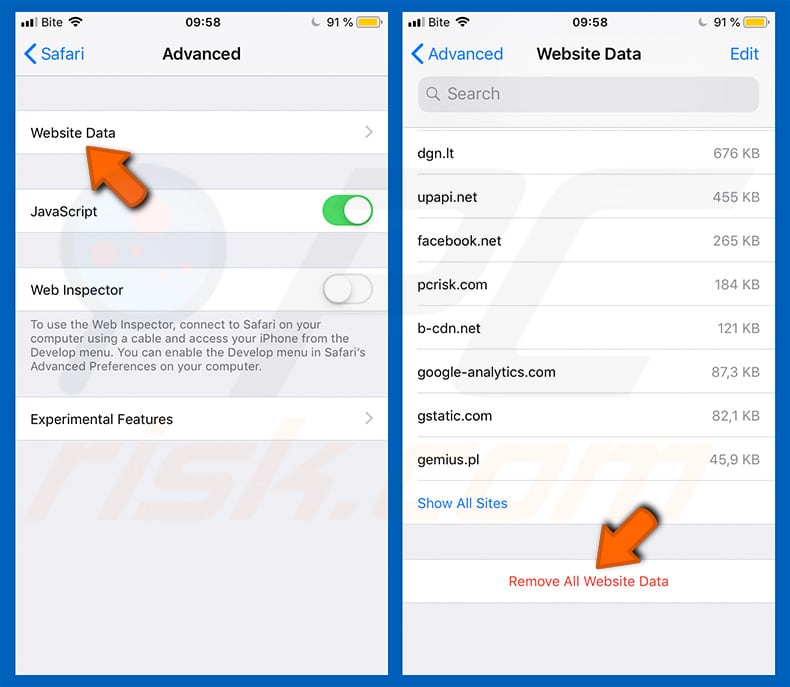
Instant automatic malware removal:
Manual threat removal might be a lengthy and complicated process that requires advanced IT skills. Combo Cleaner is a professional automatic malware removal tool that is recommended to get rid of malware. Download it by clicking the button below:
DOWNLOAD Combo CleanerBy downloading any software listed on this website you agree to our Privacy Policy and Terms of Use. To use full-featured product, you have to purchase a license for Combo Cleaner. 7 days free trial available. Combo Cleaner is owned and operated by RCS LT, the parent company of PCRisk.com.
Quick menu:
- What is "vinkens[.]com"?
- STEP 1. Remove PUA related files and folders from OSX.
- STEP 2. Remove rogue extensions from Safari.
- STEP 3. Remove rogue add-ons from Google Chrome.
- STEP 4. Remove potentially unwanted plug-ins from Mozilla Firefox.
Video showing how to remove adware and browser hijackers from a Mac computer:
Potentially unwanted applications removal:
Remove potentially unwanted applications from your "Applications" folder:
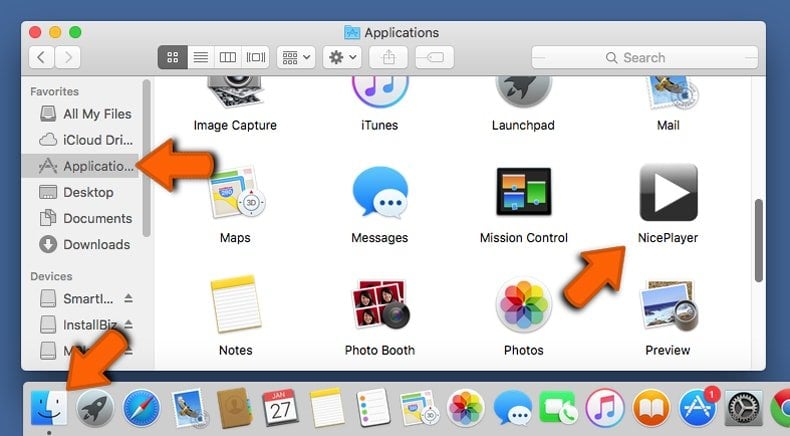
Click the Finder icon. In the Finder window, select "Applications". In the applications folder, look for "MPlayerX","NicePlayer", or other suspicious applications and drag them to the Trash. After removing the potentially unwanted application(s) that cause online ads, scan your Mac for any remaining unwanted components.
DOWNLOAD remover for malware infections
Combo Cleaner checks if your computer is infected with malware. To use full-featured product, you have to purchase a license for Combo Cleaner. 7 days free trial available. Combo Cleaner is owned and operated by RCS LT, the parent company of PCRisk.com.
Remove adware-related files and folders
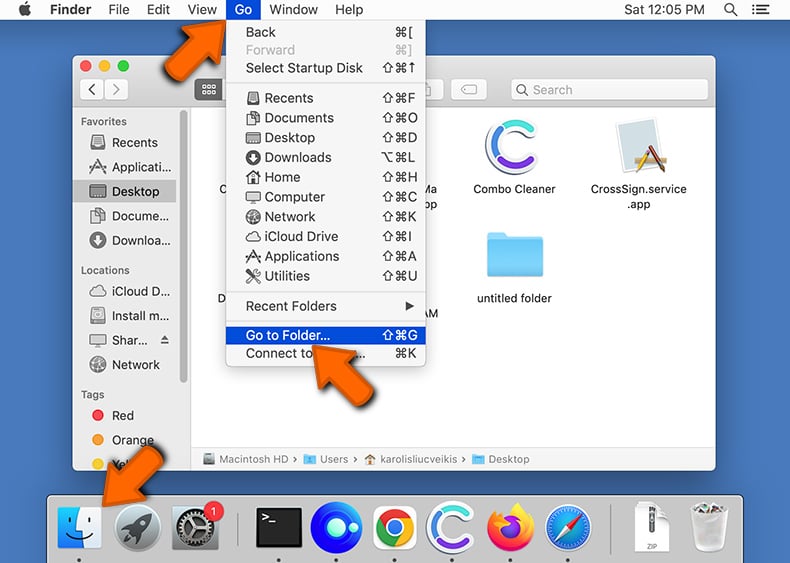
Click the Finder icon, from the menu bar. Choose Go, and click Go to Folder...
 Check for adware generated files in the /Library/LaunchAgents/ folder:
Check for adware generated files in the /Library/LaunchAgents/ folder:
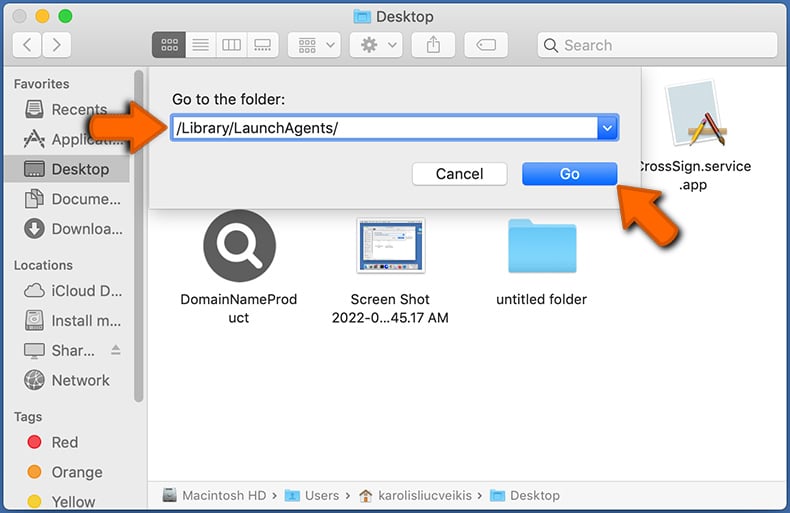
In the Go to Folder... bar, type: /Library/LaunchAgents/
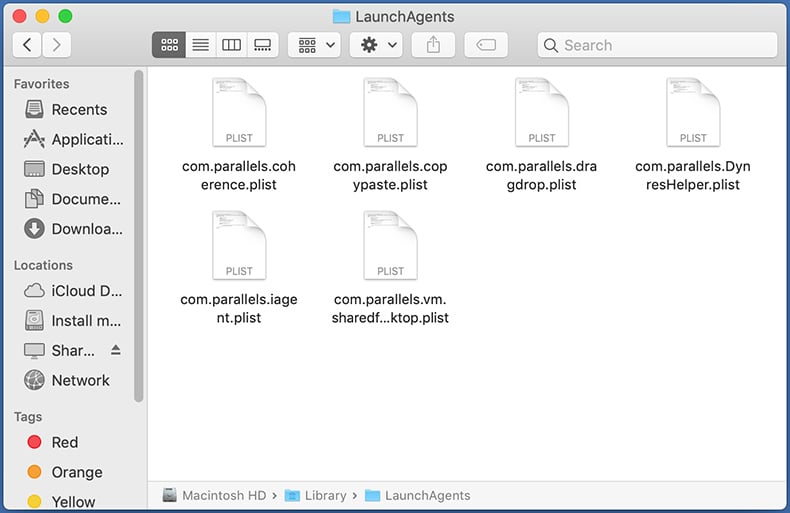
In the "LaunchAgents" folder, look for any recently-added suspicious files and move them to the Trash. Examples of files generated by adware - "installmac.AppRemoval.plist", "myppes.download.plist", "mykotlerino.ltvbit.plist", "kuklorest.update.plist", etc. Adware commonly installs several files with the exact same string.
 Check for adware generated files in the ~/Library/Application Support/ folder:
Check for adware generated files in the ~/Library/Application Support/ folder:
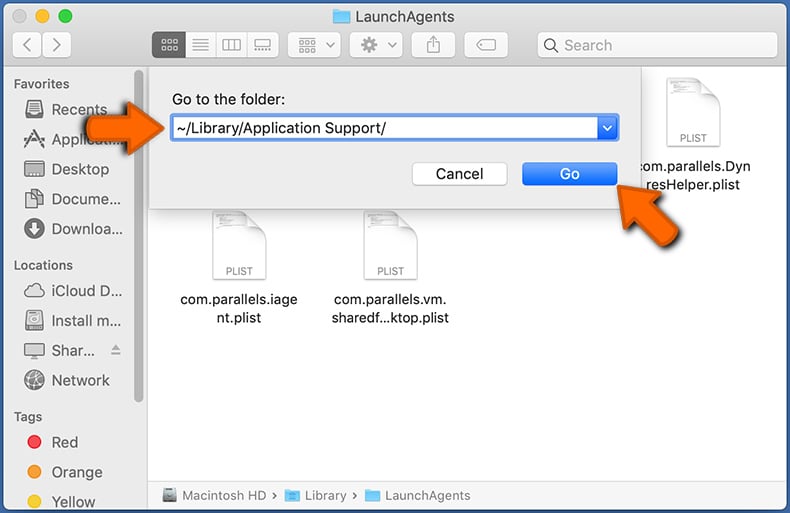
In the Go to Folder... bar, type: ~/Library/Application Support/
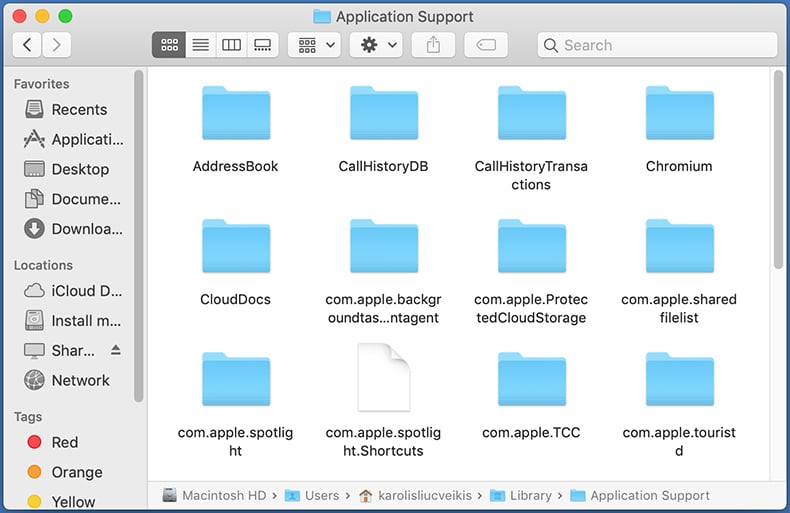
In the "Application Support" folder, look for any recently-added suspicious folders. For example, "MplayerX" or "NicePlayer", and move these folders to the Trash.
 Check for adware generated files in the ~/Library/LaunchAgents/ folder:
Check for adware generated files in the ~/Library/LaunchAgents/ folder:
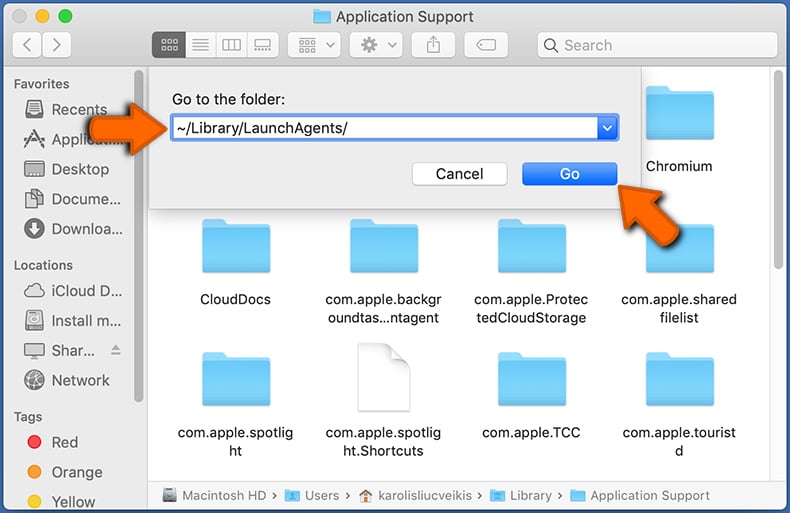
In the Go to Folder... bar, type: ~/Library/LaunchAgents/
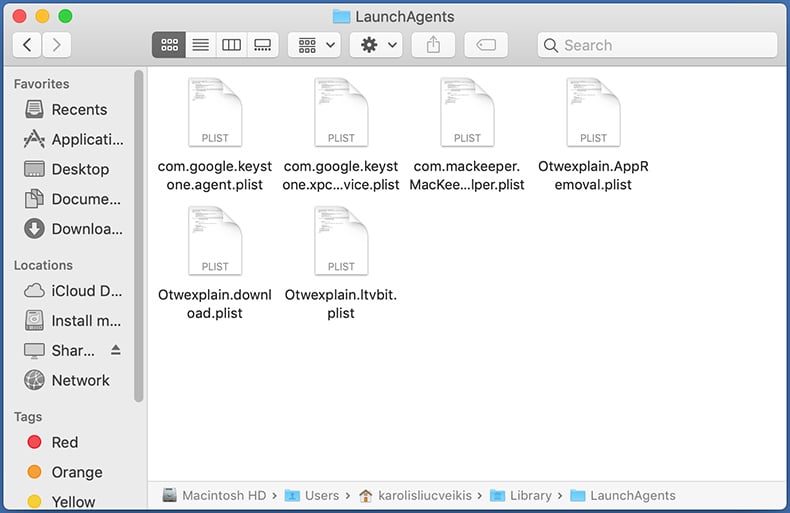
In the "LaunchAgents" folder, look for any recently-added suspicious files and move them to the Trash. Examples of files generated by adware - "installmac.AppRemoval.plist", "myppes.download.plist", "mykotlerino.ltvbit.plist", "kuklorest.update.plist", etc. Adware commonly installs several files with the exact same string.
 Check for adware generated files in the /Library/LaunchDaemons/ folder:
Check for adware generated files in the /Library/LaunchDaemons/ folder:
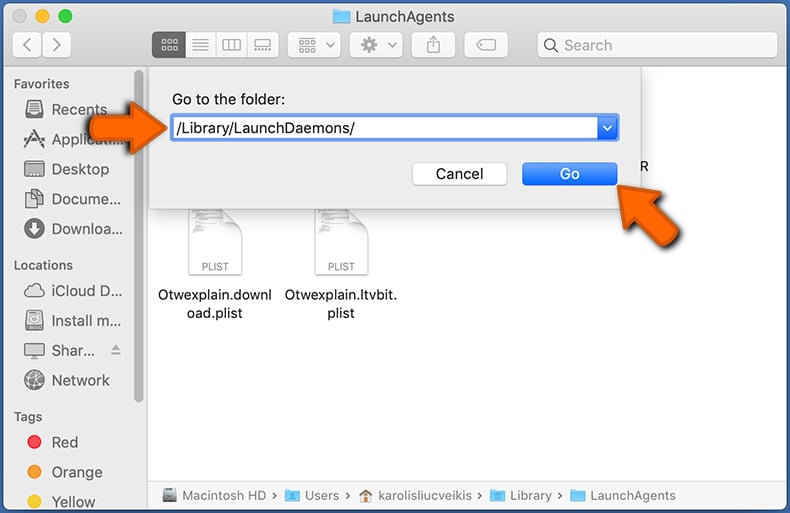
In the "Go to Folder..." bar, type: /Library/LaunchDaemons/
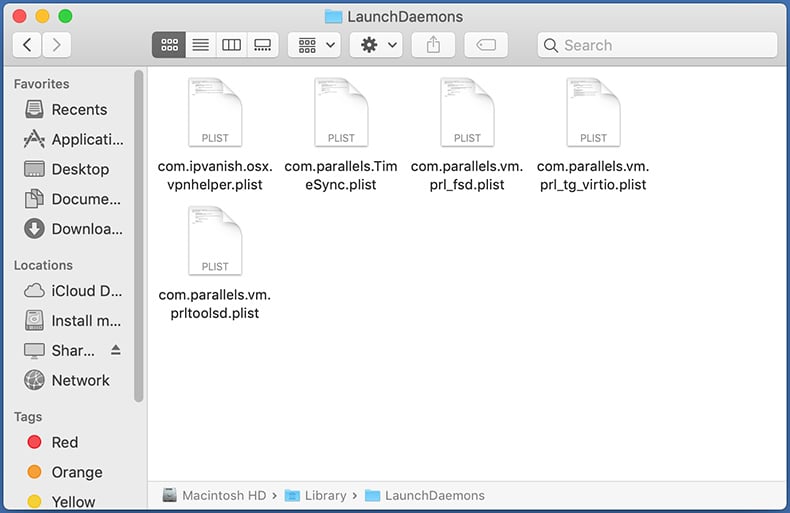
In the "LaunchDaemons" folder, look for recently-added suspicious files. For example "com.aoudad.net-preferences.plist", "com.myppes.net-preferences.plist", "com.kuklorest.net-preferences.plist", "com.avickUpd.plist", etc., and move them to the Trash.
 Scan your Mac with Combo Cleaner:
Scan your Mac with Combo Cleaner:
If you have followed all the steps correctly, your Mac should be clean of infections. To ensure your system is not infected, run a scan with Combo Cleaner Antivirus. Download it HERE. After downloading the file, double click combocleaner.dmg installer. In the opened window, drag and drop the Combo Cleaner icon on top of the Applications icon. Now open your launchpad and click on the Combo Cleaner icon. Wait until Combo Cleaner updates its virus definition database and click the "Start Combo Scan" button.
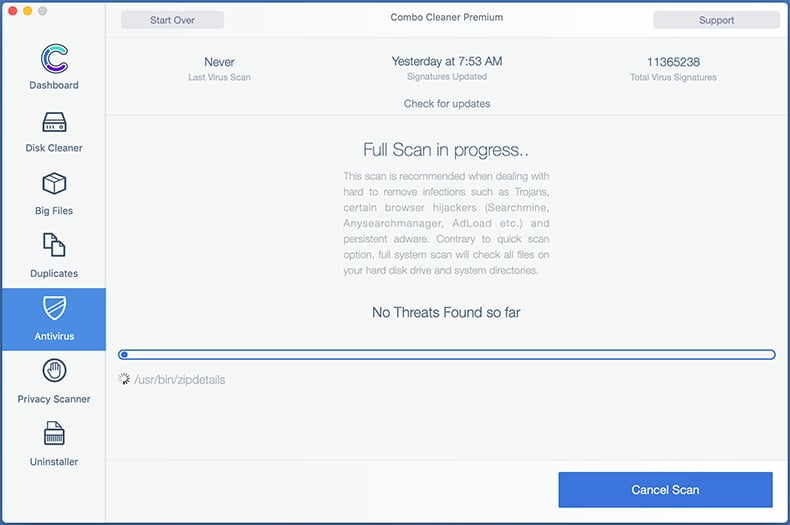
Combo Cleaner will scan your Mac for malware infections. If the antivirus scan displays "no threats found" - this means that you can continue with the removal guide; otherwise, it's recommended to remove any found infections before continuing.
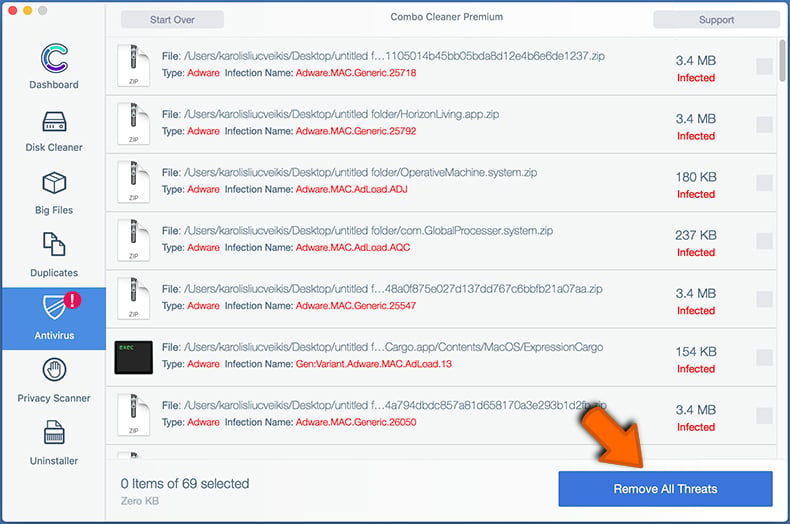
After removing files and folders generated by the adware, continue to remove rogue extensions from your Internet browsers.
Remove malicious extensions from Internet browsers
 Remove malicious Safari extensions:
Remove malicious Safari extensions:
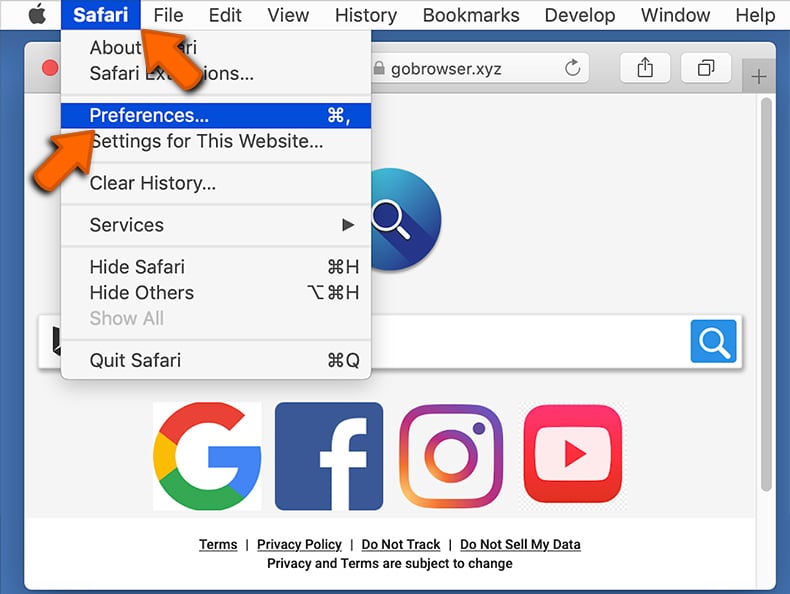
Open the Safari browser, from the menu bar, select "Safari" and click "Preferences...".
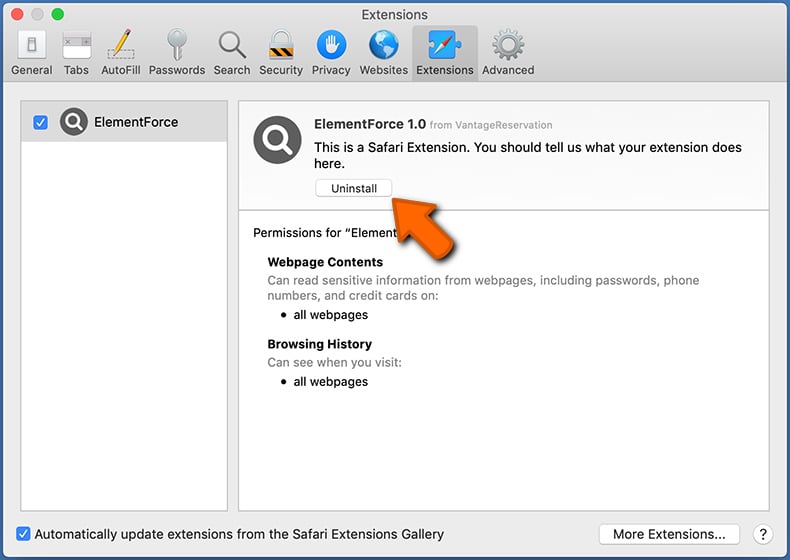
In the preferences window, select "Extensions" and look for any recently-installed suspicious extensions. When located, click the "Uninstall" button next to it/them. Note that you can safely uninstall all extensions from your Safari browser - none are crucial for regular browser operation.
- If you continue to have problems with browser redirects and unwanted advertisements - Reset Safari.
 Remove malicious extensions from Google Chrome:
Remove malicious extensions from Google Chrome:
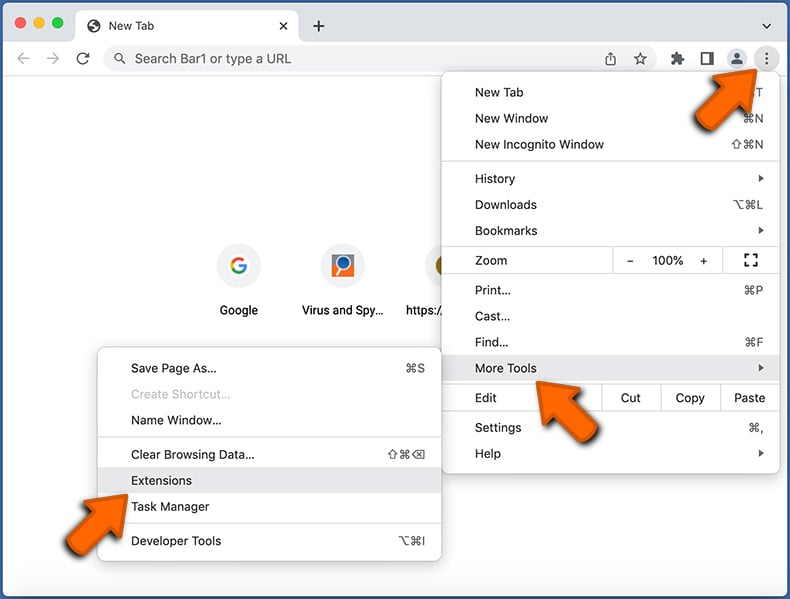
Click the Chrome menu icon ![]() (at the top right corner of Google Chrome), select "More Tools" and click "Extensions". Locate all recently-installed suspicious extensions, select these entries and click "Remove".
(at the top right corner of Google Chrome), select "More Tools" and click "Extensions". Locate all recently-installed suspicious extensions, select these entries and click "Remove".
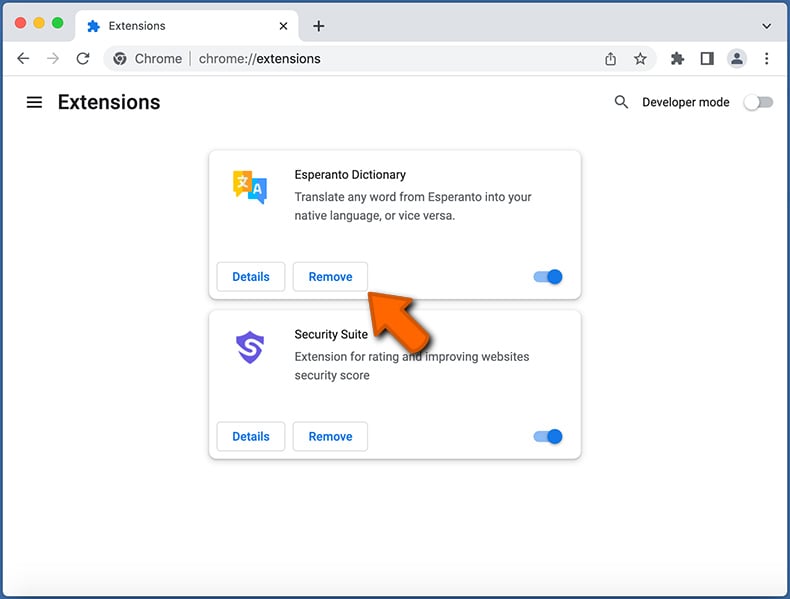
- If you continue to have problems with browser redirects and unwanted advertisements - Reset Google Chrome.
 Remove malicious extensions from Mozilla Firefox:
Remove malicious extensions from Mozilla Firefox:
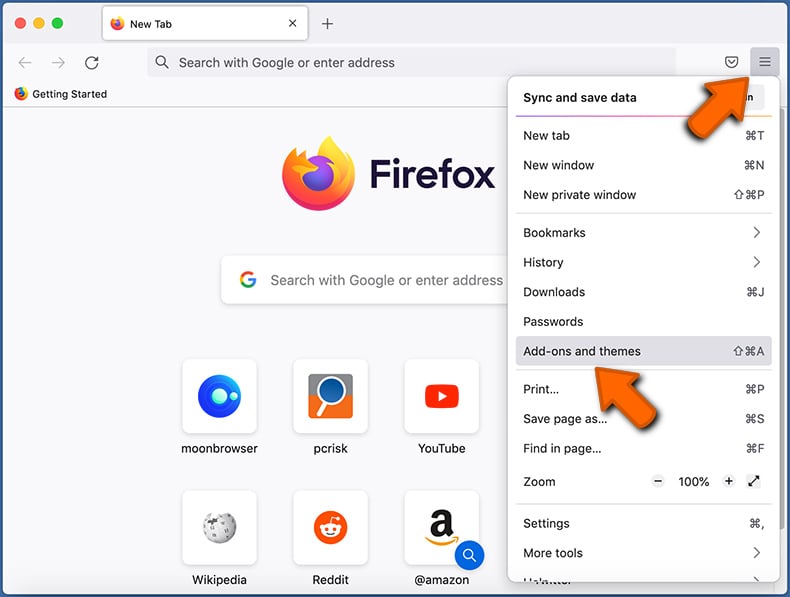
Click the Firefox menu ![]() (at the top right corner of the main window) and select "Add-ons and themes". Click "Extensions", in the opened window locate all recently-installed suspicious extensions, click on the three dots and then click "Remove".
(at the top right corner of the main window) and select "Add-ons and themes". Click "Extensions", in the opened window locate all recently-installed suspicious extensions, click on the three dots and then click "Remove".
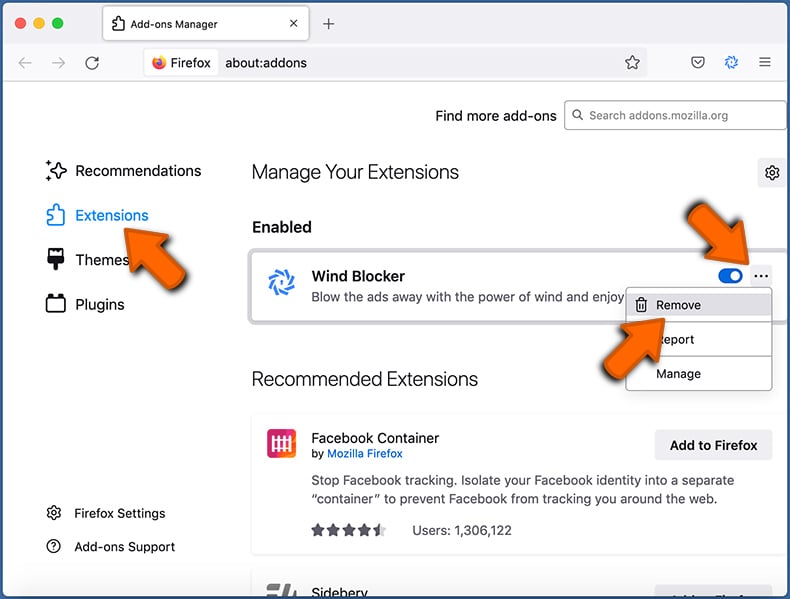
- If you continue to have problems with browser redirects and unwanted advertisements - Reset Mozilla Firefox.
Frequently Asked Questions (FAQ)
What is a pop-up scam?
Pop-up scams are essentially deceptive messages designed to scare/entice users into performing specific actions, e.g., downloading/installing software, making monetary transactions, disclosing vulnerable information, calling fake helplines, and so on.
What is the purpose of a pop-up scam?
All scams are created to generate revenue for their designers, yet how they achieve this - differs. Cyber criminals primarily profit by obtaining funds through deception, abusing or selling private data, promoting (likely fake/harmful) applications, or proliferating malware.
Why do I encounter fake pop-ups?
Pop-up scams are promoted on various rogue websites. Most users enter such pages via mistyped URLs or redirects caused by spam browser notifications, sites that use rogue advertising networks, intrusive adverts, or installed adware.
Will Combo Cleaner protect me from pop-up scams?
Combo Cleaner is capable of scanning visited websites and detecting malicious ones. Note that pages running pop-up scams also fall within this category; therefore, you will be warned immediately, and access to such sites will be blocked.
Share:

Tomas Meskauskas
Expert security researcher, professional malware analyst
I am passionate about computer security and technology. I have an experience of over 10 years working in various companies related to computer technical issue solving and Internet security. I have been working as an author and editor for pcrisk.com since 2010. Follow me on Twitter and LinkedIn to stay informed about the latest online security threats.
PCrisk security portal is brought by a company RCS LT.
Joined forces of security researchers help educate computer users about the latest online security threats. More information about the company RCS LT.
Our malware removal guides are free. However, if you want to support us you can send us a donation.
DonatePCrisk security portal is brought by a company RCS LT.
Joined forces of security researchers help educate computer users about the latest online security threats. More information about the company RCS LT.
Our malware removal guides are free. However, if you want to support us you can send us a donation.
Donate
▼ Show Discussion